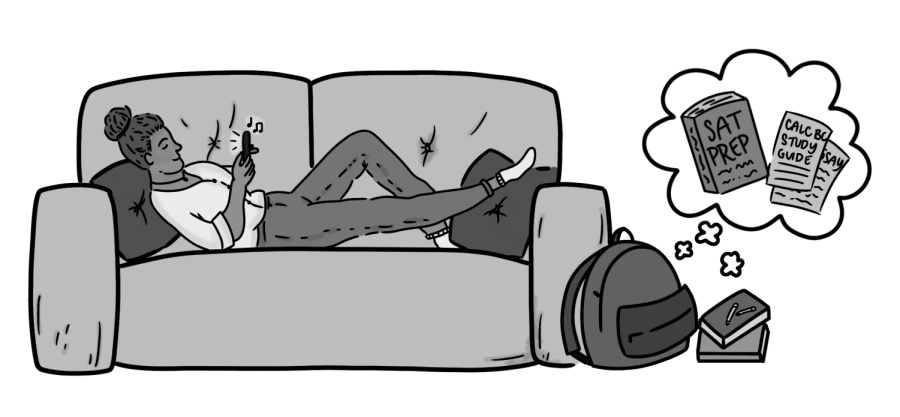CAMPUS: Many students combat a cycle of procrastination
A student comes home from school, planning to take a brief, five-minute break before starting their homework. Before long, five TV episodes have been played, and – confident their work will not take long – the student decides to play with their dog. Toward the end of the night, the student starts a project, which is due the next day but was assigned several weeks ago.
Many students find themselves falling into the loophole of procrastination, preventing them from finishing their tasks in any timely manner. Freshman Varun Dangeti shared his experiences with procrastinating on assignments, and explained that such habits often result in his assignments not meeting their highest potential.
“Procrastination, in my experience, is pushing work to the end and saying that I can do it the next day, but it results in a lower quality of work,” Dangeti said.
Junior Megan Anderson’s definition of procrastination is similar to Dangeti’s, but she explained that for her, the experience tends to occur from exhaustion or burnout.
“I would define it (procrastination) as putting stuff off because you don’t have the energy to do it, or putting it off because you just don’t want to think about it,” Anderson said.
Dangeti found that he procrastinates on a daily basis and believes that it is due to his mentality.
“If I have two days to work on it (an assignment), I feel like I can finish it on the second day even if I have the first day to work on it,” Dangeti said. “In my mind, I’ll just say, ‘I don’t have it in me to work on it on the first day, so I’ll do it on the second day.’”
Dangeti recognized that he procrastinates more on assignments where he is given more time to complete them.
“If I have less time, then I have to do it because I still care about my grade,” Dangeti said. “When I have more time, I’ll definitely prioritize other things first.”
According to sophomore Manasa Satish, the impact of distance learning during the COVID-19 pandemic negatively impacted her relationship with timeliness.
“I would just do them (assignments) at the last moment and then turn it in without thinking twice because I knew I would get a 100,” Satish said.
Freshman Ishaan Rout shared a similar experience. He found that during distance learning, all assignments were due at night instead of at the end of a class period, which was common prior to distance learning.
“In quarantine, everything was due at midnight, so during the class, I procrastinated more,” Rout said.
English teacher Christy Gutierrez believes that students who tend to procrastinate must find ways to combat procrastination, such as setting deadlines for themselves.
Many students, such as Anderson, agree, and have found ways to limit distractions that may encourage procrastination while studying or being productive.
“I’ll put my phone in another room or just turn off the sound,” Anderson said. “If it’s an assignment that I know I really have to finish, I’ll try to stay as focused as I can.”
For Dangeti, being around others who are also working often allows him to focus on assignments.
“If I really don’t want to procrastinate, I’ll sit downstairs and do my homework,” Dangeti said. “That way my parents can keep me on track.”
Gutierrez shared that getting up earlier and completing her more difficult tasks before work helps her avoid procrastination during the day.
“I get my harder things done in the mornings so that the rest of my day goes smoothly,” Gutierrez said.
Dangeti has discovered that the best time to complete his tasks is at night due to the quiet environment at home that helps him focus.
“I can’t put it off any longer, and it’s (the environment is) more peaceful to me,” Dangeti said. “In the day, I could be spending my time doing better things, so it causes procrastination, but in the night, if I finish it (the assignment), I can go to sleep.”
Gutierrez acknowledged that procrastination is something many students struggle with and shared a piece of advice in hopes of helping students tackle procrastination and strengthen their time management.
“Find a certain time of day where you work best and try to chip away at any task in front of you piece by piece instead of seeing it as this huge thing that you can’t do,” Gutierrez said. “Tackle it step by step instead of putting it off as this momentous thing that you don’t even want to start.”


